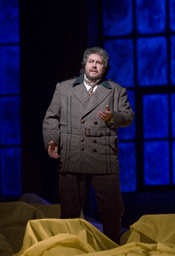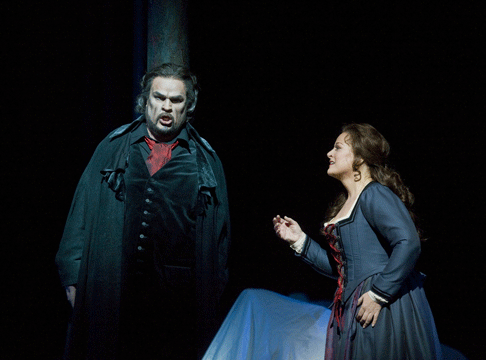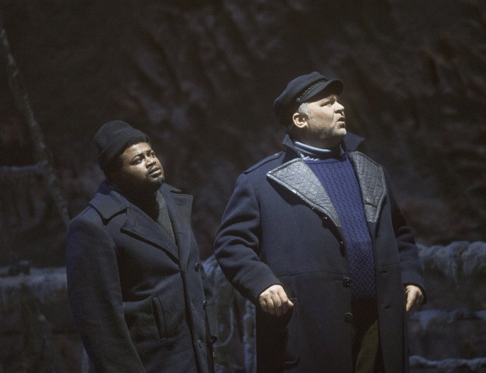26 Apr 2010
Der Fliegende Holländer, New York
Pick the word: soupçon? snippet? tidbit? quark? to describe the infinitesimal bite of Wagner bestowed upon us by the Met this year — and we had to wait till the end of April, to boot!

Pick the word: soupçon? snippet? tidbit? quark? to describe the infinitesimal bite of Wagner bestowed upon us by the Met this year — and we had to wait till the end of April, to boot!
We must be grateful for what we can scrounge, and Der Fliegende Holländer, Wagner’s Weber-like romantic fable of the vampire-like sea captain doomed to sail till he meets the woman faithful to death, in August Everding’s outsize production, provides some sumptuous music-making. Holländer, indeed, has grown sufficiently unfamiliar to New Yorkers that many members of the audience were outraged to find they were expected to sit still for two and a half hours without intermission (though you’d have to go back nearly forty years to find a Met production of the opera that did include intermissions), and several of them walked out during the second scene-changing entr’acte.
 Stephen Gould as Erik
Stephen Gould as Erik
The vocal standard of the evening was impressively high. Finnish
bass-baritone Juha Uusitalo, who has been singing Wotan around Europe, gave us
a suave, passionate Dutchman with a smooth, even, grateful sound. A tall man
and a fine actor, he was got up to look pale, raven-haired, huge of eye and
lofty of brow, rather like Wagner’s friend, King Ludwig of Bavaria
— appropriately; the king drowned.
Uusitalo would have been the star of the evening had not Hans-Peter König been singing the bumptious Daland. König has one of those godlike basses (think Matti Salminen or Kurt Moll), clear and even from top to bottom, enormous but graciously so, never oppressive, never bellowed, as gently nuanced as if he were singing lieder. You will think: if there’s a God, he sounds like this. It was the A-list performance of the night.
Stephen Gould, an American tenor who has been singing Siegfried in Vienna to great acclaim, made his Met debut as Erik. An enormous figure on stage, Gould has a voice as sturdy as his linebacker build and a clarion delivery, but has a tendency to hurl it out brusquely when romantic gentility seems called for, especially in this dreamy role. His bark was not harsh but it was unfinished — which seems right for the half-savage Siegfried but not for Erik. When he sang, one pricked up one’s ears — but when Mr. König sang, pricking up of ears wasn’t necessary — the voice came out into the theater and seduced us. Russell Thomas provided an energetic Steersman, seeming a bit small-scale in such company.
 Deborah Voigt as Senta and Juha Uusitalo as the Dutchman
Deborah Voigt as Senta and Juha Uusitalo as the Dutchman
Deborah Voigt sang her first staged Senta. She looked good and hurled herself ardently about the room — at one point bringing the house to giggles, unintentionally one supposes: As Erik described his dream of the arrival of the Dutchman, she abruptly “assumed the position,” head back, legs spread, in anticipation. Her voice, though, was not in happy estate, stringy and unattractive for much of the night and occasionally flat. She nailed the “treu” on her final “treue als dem Tod,” but it was a bit late in the evening to rescue this heroic figure. Senta is a young girl with an earth mother coiled audibly within her, bursting out into thrilling cries. Senta — indeed Wagner — is not a good choice for Voigt’s instrument these days.
 Hans-Peter König as Daland and Russell Thomas as the Steersman
Hans-Peter König as Daland and Russell Thomas as the Steersman
In the pit, Kazushi Ono, undeterred by occasional intrusive applause and the departure of those unwilling to do without intermissions, kept the oceanic rhythms of this nautical ghost story in driving motion. The only sounds one regretted were not in his department at all — the squeak of the metal gangway as it descended to the stage in Act I. It has indeed been years since its last use (seven by the story, ten at the Met), and we had an undesired squealing obbligato. This however had been oiled away by the final scene — good catch, Met crew!
John Yohalem